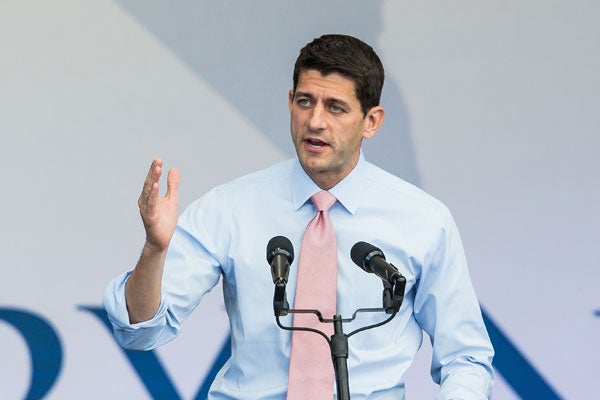Paul Ryan: How Conservatism Helps the Poor
David Azerrad /
When it comes to explaining how their policies would help the poor and the disadvantaged, conservatives can all too often be likened to a football team that drives all the way to the one-yard line and then just kneels down. Rock-solid principles and policies drive them forward, but they fail to take that last extra little step and explain how these policies would help all Americans—especially those at the bottom who most need a hand up and a way out.
And because of this, the left’s grotesque claims that capitalism allows the 1 percent to fleece the 99 percent or that conservatism is a ploy to justify government of the rich, by the rich, and for the rich are left standing.
How exciting and invigorating, then, to see a prominent conservative clearly explain how conservative policies sustain the American Dream for all Americans. Yesterday in Cleveland, Representative Paul Ryan (R–WI) delivered one of the best speeches in recent memory that articulated the conservative vision of an America where prosperity and opportunity flourish and the “engines of upward mobility” are on full throttle.
It’s a must-read for those who want to learn how to make a compelling case for conservatism.
Ryan’s argument unfolds in seven steps:
- Define and reclaim the mantle of the American Dream. “We are here in partnership on behalf of an idea—that no matter who your parents are, no matter where you come from, you should have the opportunity in America to rise, to escape from poverty, and to achieve whatever your God-given talents and hard work enable you to achieve.” Given the left’s efforts to redefine the dream along statist and egalitarian lines, this is crucial.
- Recognize the obstacles that many face. “Too many children, especially African-American and Hispanic children, are sent into mediocre schools and expected to perform with excellence.… There is something wrong in our country when 40 percent of children born to parents in the lowest fifth of earners never know anything better.… In this war on poverty, poverty is winning.” In other words, don’t make the mistake of assuming that because the left’s claims about poverty in America are wildly overblown, everything must be fine and dandy.
- Big government doesn’t help the poor. “With a few exceptions, government’s approach has been to spend lots of money on centralized, bureaucratic, top-down anti-poverty programs. The mindset behind this approach is that a nation should measure compassion by the size of the federal government and how much it spends. The problem is, starting in the 1960s, this top-down approach created and perpetuated a debilitating culture of dependency, wrecking families and communities.”
- Conservatism isn’t a code word for selfishness. “Well, to hear some tell it, we think everybody should just fend for themselves. But that’s just a false argument—a straw man set up to avoid genuine debate.… I believe in true compassion and upward mobility.”
- A strong economy helps the poor. “Many of those living in poverty today were in the middle class just a few years ago. We can help them regain the ground they’ve lost, with a focus on growth all across the American economy.”
- Civil society is the great alternative to big government. “Part of what makes America great is that when we don’t succeed, we look out for one another through our communities.… There’s a vast middle ground between the government and the individual. Our families and our neighborhoods, the groups we join and our places of worship—this is where we live our lives. They shape our character, give our lives direction, and help make us a self-governing people.”
- And of course we believe in a strong safety net. “Where government is entrusted with providing a safety net, Mitt Romney and I have our own vision for how to keep it strong. It is a vision that leaves the failures of the past in the past, and proposes instead to build on those reforms that have worked.”

